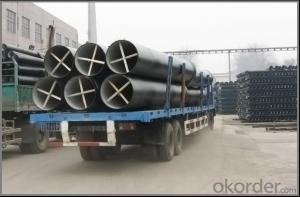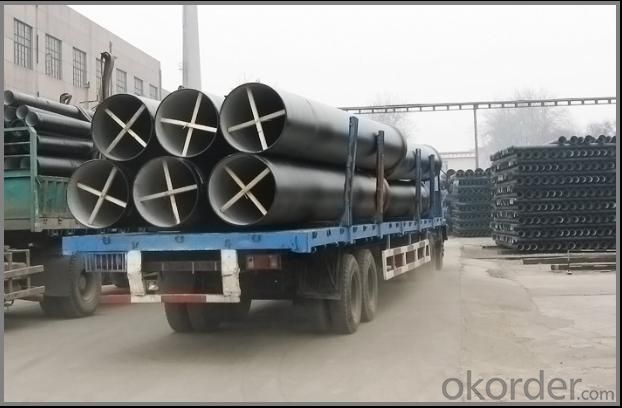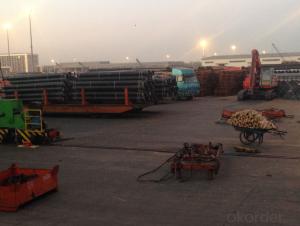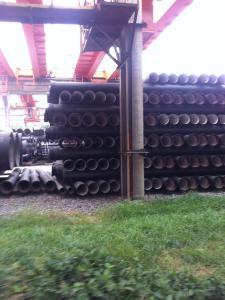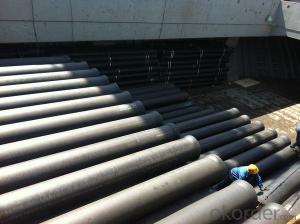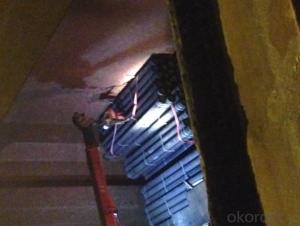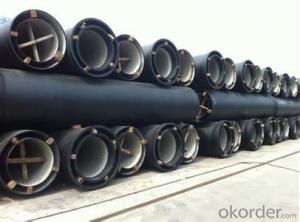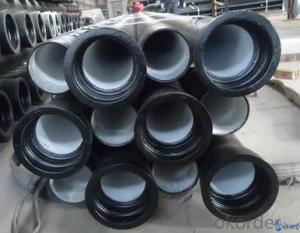DUCTILE IRON PIPES AND PIPE FITTINGS DN100
- Loading Port:
- Tianjin
- Payment Terms:
- TT OR LC
- Min Order Qty:
- 25 m.t
- Supply Capability:
- 30000 m.t/month
OKorder Service Pledge
OKorder Financial Service
You Might Also Like
Material : Ductile Cast Iron
Size Range : DN 80mm to DN 2000mm
Unit Effective Length : 6m or 5.7m
Manufacture Standard: ISO 2531:1998/ EN 545:2006/EN 598:2007
Annual capacity : 200,000 tons
Coating Exterior: Zinc 130g/m2 according to ISO 8179-1 and bitumen coating 70 microns.
Cement Interior: Portland Cement/ High Alumina Cement/ Sulphate Resisting Cement Lining according to ISO 4179
Special requirements on external coating and internal lining can be applied
We also provide accessories such as SBR/EPDM rubber gaskets, lubricant paste, pipe caps, PE sleeves, etc.
Additional Parts:
Each pipe is strictly inspected according to related standard to ensure permanently high performance.
Easy Installation at site and service free for life
Long Service Lifespan
Quotation will arrive you within 24hours once we get your inquiry.
We guarantee offering you a competitive price.
A copy of original inspection reports of pipes will be offered after shipment.
Photos of loading process will be sent to the customer after shipment effect.
We will follow-up the delivery progress after shipment effect and update to the customer on weekly basis.
- Q: How does ductile iron pipe perform in high-temperature environments?
- Ductile iron pipe performs well in high-temperature environments due to its superior strength and thermal resistance. It can withstand elevated temperatures without significant deformation or structural damage, making it a reliable choice for various applications requiring high-temperature resistance.
- Q: How do ductile iron pipes perform in acidic soil conditions?
- Ductile iron pipes have a reputation for being durable and resistant to different environmental conditions, including acidic soil conditions. When exposed to acidic soil, these pipes exhibit excellent resistance to corrosion due to their unique composition and protective coating. The high carbon content in ductile iron pipes gives them inherent resistance to corrosion, even in acidic environments. Additionally, these pipes are typically lined with cement mortar or a suitable epoxy coating, which provides an extra layer of protection against acid attack. The combination of the high carbon content and protective coating creates a barrier that prevents direct contact between the acid and the iron, thus minimizing the risk of corrosion. This ensures that the pipes remain structurally sound and maintain their integrity over a long period of time. Furthermore, ductile iron pipes have a long service life and are designed to withstand a wide range of soil conditions. Their strength and flexibility enable them to endure the stresses and strains caused by the surrounding soil, including acidic soil environments. This makes them an ideal choice for applications in soils with higher acidity levels. It is important to note that while ductile iron pipes perform well in acidic soil conditions, the severity and concentration of the acid can affect their performance. In extremely aggressive or highly concentrated acidic environments, additional corrosion protection measures may be necessary, such as sacrificial anodes or cathodic protection systems. In conclusion, ductile iron pipes are highly resilient and excel in acidic soil conditions. Their corrosion resistance, combined with their strong structure and protective coating, ensures their longevity and reliability, making them a preferred choice for various applications in such environments.
- Q: Can ductile iron pipes be repaired if they are damaged?
- Ductile iron pipes can undergo repairs if they sustain damage. The necessary repair method will depend on the extent of the damage. In instances where the pipe is cracked or has small holes, a repair clamp or a stainless-steel sleeve can be utilized to seal the affected area. These approaches offer a temporary solution, allowing water to continue flowing until a more permanent fix can be implemented. For more severe damage, such as significant cracks or broken segments, a complete replacement may be required. This process entails removing the damaged section of the pipe and installing a new piece. It is a specialized task that demands specific equipment and expertise, but it effectively restores the pipe's functionality. It is crucial to note that only trained professionals with experience in working with ductile iron should carry out the repairs. This ensures proper execution and safeguards the integrity and safety of the pipeline system. Regular inspection and maintenance of ductile iron pipes can aid in early detection of potential issues, preventing extensive damage that may necessitate replacement instead of repair.
- Q: Ductile iron pipe in the direction of it?
- The use of cast iron by adding more than 18 nodularizer, after centrifugal ductile cast iron machine high speed centrifugal cast pipe, called "ductile" (Ductile Cast Iron Pipes), referred to as ball pipe, ductile iron pipe and ductile iron pipe etc..
- Q: Are ductile iron pipes resistant to seismic events?
- Yes, ductile iron pipes are generally resistant to seismic events. Ductile iron is a type of cast iron that is known for its high strength and durability. It has the ability to withstand significant external forces, including those caused by seismic events such as earthquakes. Ductile iron pipes are designed to be flexible and can absorb and dissipate the energy generated by seismic waves. This flexibility allows the pipes to withstand ground movements and vibrations without breaking or cracking. Additionally, the joints of ductile iron pipes are designed to provide some degree of flexibility, which further enhances their resilience against seismic events. Moreover, ductile iron pipes are constructed with thick walls, providing them with a high level of structural integrity. This strength makes them less susceptible to damage during seismic events and helps maintain the flow of water and other fluids even under extreme conditions. However, it is important to note that the resistance of ductile iron pipes to seismic events can also depend on various factors such as the magnitude and proximity of the earthquake, the quality of installation and maintenance, and the specific design considerations for the pipeline system. Therefore, it is crucial to ensure that proper engineering and construction practices are followed to maximize the resilience of ductile iron pipes in seismic-prone areas.
- Q: How is ductile iron different from cast iron?
- Ductile iron and cast iron are two iron alloys with varying compositions, properties, and uses. The primary distinction between the two lies in their microstructure and mechanical properties. Ductile iron, also known as spheroidal graphite iron or nodular cast iron, is a type of cast iron that undergoes an extra treatment process to enhance its strength and ductility. This is achieved by adding small amounts of magnesium to the molten iron during casting, resulting in the formation of graphite nodules throughout the material. These nodules act as stress raisers, preventing crack propagation and making ductile iron more resistant to fractures and more flexible compared to cast iron. In contrast, cast iron is an iron alloy with a higher carbon content than ductile iron. This higher carbon content leads to the formation of graphite flakes within the material, giving cast iron its characteristic brittleness. Due to its brittleness, cast iron is more prone to cracking and less flexible than ductile iron. However, cast iron exhibits excellent compressive strength and is highly resistant to wear and abrasion, making it suitable for applications where strength and durability are crucial, such as engine blocks, pipes, and manhole covers. Another difference between ductile iron and cast iron can be observed in their machinability. Ductile iron is generally easier to machine due to its lower carbon content and the presence of graphite nodules, which act as lubricants during the cutting process. On the other hand, the presence of graphite flakes in cast iron can cause tool wear and result in a poor surface finish during machining. In summary, ductile iron and cast iron differ in their microstructure, mechanical properties, and applications. Ductile iron offers improved ductility and fracture resistance, making it suitable for applications that require flexibility and impact resistance. Cast iron, with its higher carbon content and graphite flakes, provides excellent compressive strength and wear resistance, making it ideal for applications that demand strength and durability.
- Q: What are the different joint types available for ductile iron pipes?
- The different joint types available for ductile iron pipes include push-on joint, mechanical joint, flanged joint, restrained joint, and grooved joint.
- Q: What are the typical joint restraint requirements for ductile iron pipes in seismic zones?
- The typical joint restraint requirements for ductile iron pipes in seismic zones include using flexible mechanical joints, such as push-on joints or restrained joints. These joints are designed to allow movement and flexibility during seismic events, reducing the risk of pipe failure or damage. Additionally, proper anchoring and bracing of the pipes at critical locations, such as bends or changes in direction, is necessary to prevent excessive movement and ensure the integrity of the pipeline system.
- Q: How do ductile iron pipes handle ground movement due to tree roots?
- Ductile iron pipes possess a robust and enduring nature, rendering them exceptionally resilient against ground movement induced by tree roots. The flexibility of ductile iron enables it to endure the pressure exerted by growing tree roots without fracturing or breaking. This capability is attributed to the material's aptitude for absorbing and dispersing stress, thereby minimizing the impact of ground movement. Furthermore, ductile iron pipes exhibit a sleek inner surface that diminishes the likelihood of tree roots infiltrating. The firmly sealed joints between the pipes likewise prevent root penetration and subsequent harm. In cases where tree roots do manage to infiltrate the soil and make contact with ductile iron pipes, their resistance to corrosion offers an additional advantage. Ductile iron pipes are coated with a protective layer that thwarts the formation of rust and corrosion, guaranteeing their long lifespan and structural integrity. Nevertheless, it is imperative to acknowledge that despite the high resistance of ductile iron pipes to ground movement caused by tree roots, regular inspection and maintenance are still advisable. This facilitates early detection and the necessary execution of repairs if any root infiltration or damage is identified.
- Q: Ductile iron 600-3 grade, tensile strength, how to test, there is a simple way?
- Generally use tensile machine to do, I often operate, or you see the metallographic 3J above perlite 60% above should be no problem
Send your message to us
DUCTILE IRON PIPES AND PIPE FITTINGS DN100
- Loading Port:
- Tianjin
- Payment Terms:
- TT OR LC
- Min Order Qty:
- 25 m.t
- Supply Capability:
- 30000 m.t/month
OKorder Service Pledge
OKorder Financial Service
Similar products
Hot products
Hot Searches
Related keywords
